Day 1 – Arrival Transfer to Colombo
“Ayubowan” Warmly Welcome to Sri Lanka, the pearl of the Indian Ocean! On arrival at Bandaranaike International Airport, you will be greeted and assisted by a representative of Globeenjoy tours (your chauffeur guide) and drive you to the hotel in Colombo. It’s the commercial hub in Sri Lanka. Check in to the hotel upon arrival, relax and freshen up your selves to start the tour on the next day.
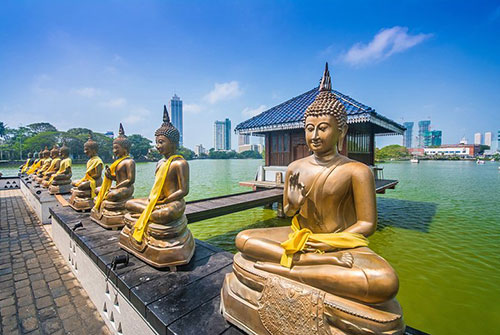 Colombo
Colombo
Colombo is the commercial capital and the largest city of Sri Lanka. It is located on the west coast of the island and adjacent to Sri Jayawardenepura Kotte (which is the official capital of Sri Lanka) suburb or the parliament capital of Sri Lanka. “Kolamba” (Anglicised “Colombo”) is a Sinhalese word; meaning port, ferry, harbor or haven. Colombo’s cosmopolitan side supports ever-more stylish eateries, galleries and shops. Surprises abound: with a little exploration you’ll find great local food, characterful shops and tiny, convivial cafes. Meanwhile, a building boom like no other is transforming the city’s skyline.
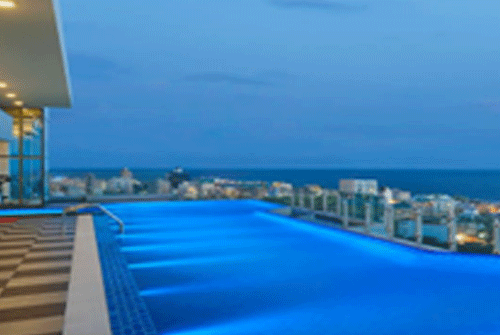 Cinnamon Red
Cinnamon Red
Revel in your journey to reach the stars at Cinnamon Red Colombo. As we soar amidst the bustling city, an inspiring ambience will greet you right at our art-infused car park. Blending in harmoniously with this aura is the state-of-the-art technology that gives you a glimpse at the express check-in. Bask in its company as it follows you to a comfortable room with a minimalistic, contemporary décor and extends to every corner. In Cinnamon Red, one of the highest rooftop bars in Colombo creates the perfect atmosphere to live it up, the infinity pool looks out at the beautiful sea of endless opportunities.
Day 2 – Colombo to Sigiriya
Breakfast at the hotel, today you will be taken to Sigiriya, one of the cities comes with historical ruins. Evening climbs the Sigiriya Rock Fortress.
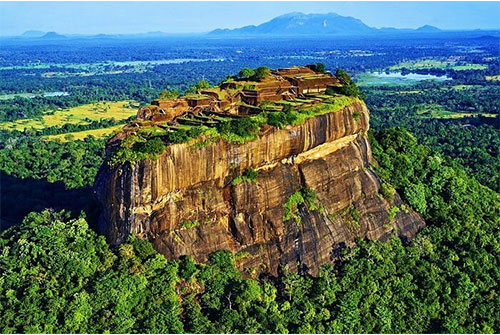 Sigiriya
Sigiriya
Sigiriya or Sinhagiri is an ancient rock fortress located in the northern Matale District near the town of Dambulla in the Central Province, Sri Lanka. The name refers to a site of historical and archaeological significance that is dominated by a massive column of rock nearly 200 meters (660 ft) high. According to the ancient Sri Lankan chronicle the Culavamsa, this site was selected by King Kasyapa (477 – 495 CE) for his new capital. He built his palace on the top of this rock and decorated its sides with colorful frescoes. On a small plateau about halfway up the side of this rock he built a gateway in the form of an enormous lion. The name of this place is derived from this structure —Sīhāgiri, the Lion Rock. The capital and the royal palace were abandoned after the king’s death.
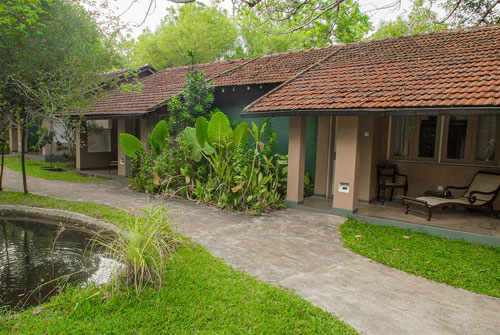 Sigiriya Village Hotel
Sigiriya Village Hotel
Welcome to Sigiriya Village. A village-themed hotel in the heart of Sri Lanka’s Cultural Triangle, tucked away in peaceful tranquility under the shade of the majestic Sigiriya Rock Fortress. Like the legendary fortress, at the foot of which it stands, it remains quietly immersed in the surrounding forest – a hidden sanctuary of rest where rural Sri Lankan hospitality is yours to experience. They believe that it is the small comforts in life that matters. Whether your room needs an extra turnover or you feel like al-fresco dining by the pool or dining in your room speak to the staff at any time with your request and they would be more than happy to help you with your request.
Day 3 – Sigiriya to Kandy
Breakfast at the hotel, Early morning safari at Minneriya National Park, thereafter you will be traveling to Kandy the hill capital in Sri Lanka. also known as the King’s last Kingdom. Visits Dambulla Temple caves & spice garden en-route.
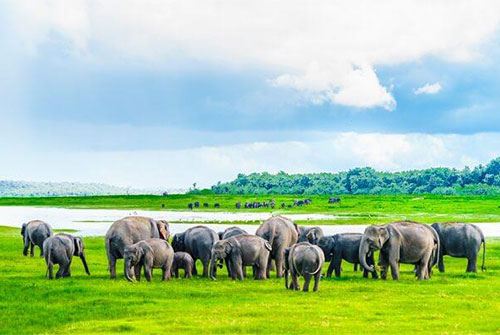 Minneriya National Park
Minneriya National Park
Minneriya National Park is in North Central Province of Sri Lanka. The area was designated as a national park on 12 August 1997, having been originally declared as a wildlife sanctuary in 1938. The reason for declaring the area as protected is to protect the catchment of Minneriya tank and the wildlife of the surrounding area. The tank is of historical importance, having been built by King Mahasen in third century AD. The park is a dry season feeding ground for the elephant population dwelling in forests of Matale, Polonnaruwa, and Trincomalee districts. Along with Kaudulla and Girithale, Minneriya forms one of the 70 Important Bird Areas (IBAs) of Sri Lanka.
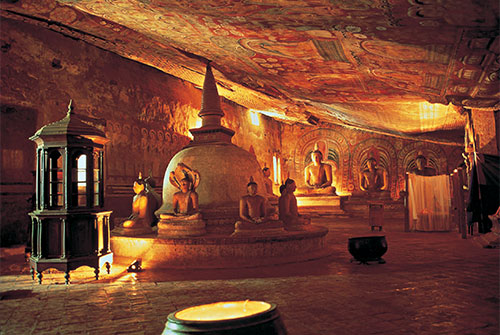 Dambulla Cave Temple
Dambulla Cave Temple
Also known as the Golden Temple of Dambulla is a World Heritage Site (1991) in Sri Lanka, situated in the central part of the country. Dambulla is the largest and best-preserved cave temple complex in the island. The rock towers 160 m over the surrounding plains. There are more than 80 documented caves in the surrounding area. Major attractions are spread over five caves, which contain statues and paintings. These paintings and statues are related to Gautama Buddha and his life. There are a total of 153 Buddha statues, three statues of Sri Lankan kings and four statues of gods and goddesses. Prehistoric Sri Lankans would have lived in these cave complexes before the arrival of Buddhism in Sri Lanka as there are burial sites with human skeletons about 2700 years old in this area, at Ibbankatuwa near the Dambulla cave complexes.
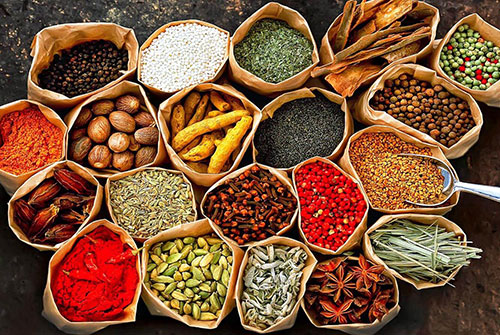 Spices in Sri Lanka
Spices in Sri Lanka
The spice trade in Asia at the time was a kind of a monopoly. The spice exchange was run by the Arabic and North African dealers who were prepared to pay a great sum of money for a pound of the fascinating thing. By the 1400’s the European sailors had realized that their ships could beat camels, so the European sailors started to sail towards Asia searching for new land and the valuable rare spices. Discovery of Vasco de Gama was a great stride in the expansion and spread of the Sri Lankan spice in the European market. Vasco de Gama’s success as a pilgrim prompted the Portuguese arrival in Sri Lanka in 1536. After sometime a settlement was reached by Portugal and Sri Lanka that incorporated a tribute of 110,000 pounds of cinnamon paid every year to Portugal by the Sinhalese Kings. Ever since Sri Lankan spices especially cinnamon was widely available in the European spice market.
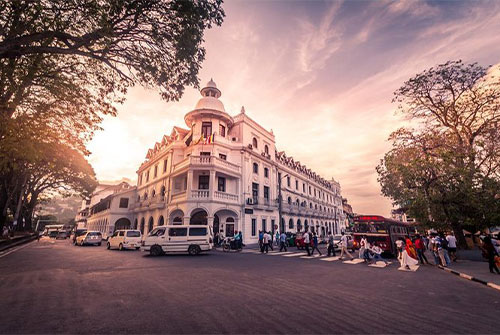 About Kandy
About Kandy
Kandy is a major city in Sri Lanka located in the Central Province. It was the last capital of the ancient kings’ era of Sri Lanka. The city lies in the midst of hills in the Kandy plateau, which crosses an area of tropical plantations, mainly tea. Kandy is both an administrative and religious city and is also the capital of the Central Province. is the home of The Temple of the Tooth Relic (Sri Dalada Maligawa), one of the most sacred places of worship in the Buddhist world. It was declared a world heritage site by UNESCO in 1988.
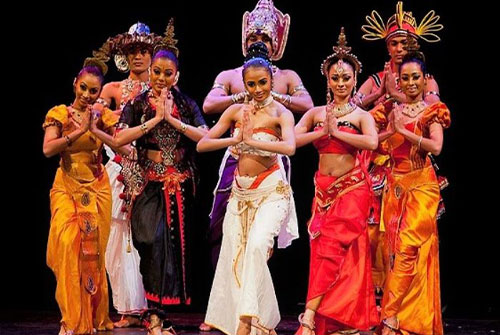 The Cultural Dance Show
The Cultural Dance Show
The culture of Sri Lanka mixes modern elements with traditional aspects and is known for its regional diversity. There are three main styles of Sri Lankan classical dance: The Kandyan dances of the Hill Country, known as Uda Rata Natum; The low country dances of the southern plains, known as Pahatha Rata Natum; Sabaragamuwa dances, or Sabaragamuwa Natum. “Ves” dance, the most popular, originated from an ancient purification ritual, the Kohomba Yakuma or Kohomba Kankariya. The dance was propitiatory, never secular, and performed only by males. Dances in low country are highly ritualistic. This form of dance is performed to appease evil spirits which cause sickness and is thus called ‘Devil Dance’. Sabaragamu dances are usually performed in Ratnapura, relating to the worshipping of God Saman much revered by local people. There are 32 main dances in Sabaragamuwa Style.
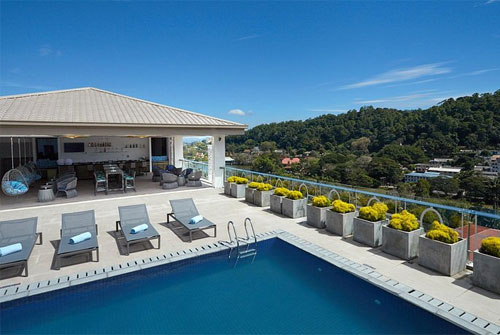 Radisson Hotel Kandy
Radisson Hotel Kandy
Radisson Hotel Kandy welcomes you to the heart of Kandy. It convenient location is ideal for business and leisure with plenty of attractions nearby. Relax in one of their 122 stylish rooms, each equipped with thoughtful and modern amenities to ensure your stay is a comfortable one. all rooms are equipped with modern and thoughtful amenities such as free Wi-Fi, coffee and tea making facilities, and a minibar to enjoy at your leisure.
Day 4 – Kandy to Colombo
Breakfast at the hotel. Last day of your tour, today you will be heading back to Colombo. Before that, you will be visiting the Temple of the tooth relic Kandy and then few interesting tourist sights en-route.
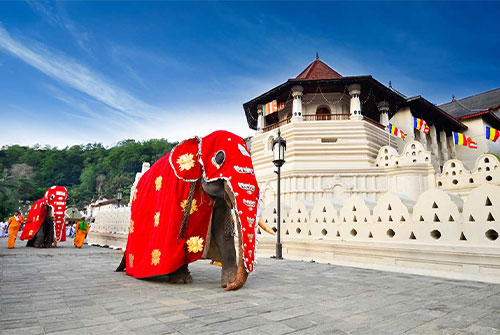 Temple of The Tooth Relic
Temple of The Tooth Relic
Sri Dalada Maligawa or the Temple of the Sacred Tooth Relic is a Buddhist temple in the city of Kandy, Sri Lanka. It is located in the royal palace complex of the former Kingdom of Kandy, which houses the relic of the tooth of the Buddha. Since ancient times, the relic has played an important role in local politics because it is believed that whoever holds the relic holds the governance of the country. Kandy was the last capital of the Sri Lankan kings and is a World Heritage Site mainly due to the temple.
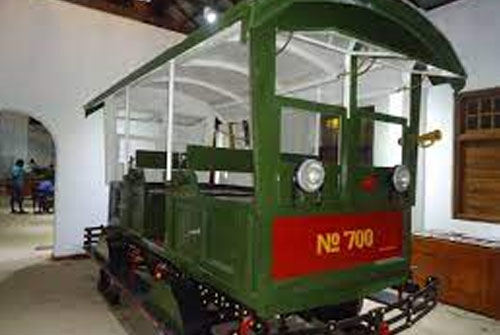 National railway museum
National railway museum
The museum was opened on 27 December 2014 in order to commemorate the 150th anniversary of railway service in Sri Lanka. Previously, the museum was located in Colombo. The old museum has been opened in May 2009. The museum has old engines, locomotives, rail cars, trolleys, carriages, machineries, and equipment’s that used since the beginning of Sri Lanka Railway. The first Train of the Ceylon Railway operated from Colombo Terminus station to Ambepussa conveying the Duke of Brabant of Belgium on 27th December 1864, This Museum Opening was held with the presence of Gathering of Special Guests and Public.
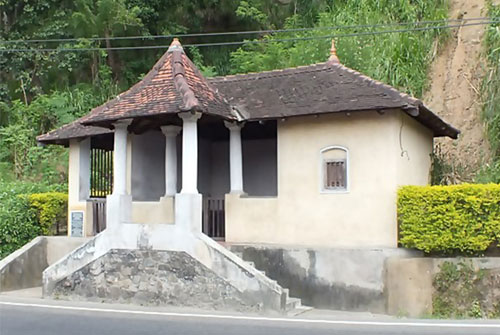 Kadugannawa Ambalama
Kadugannawa Ambalama
Ambalama is a historic wayside rest that is found – on the left, when traveling from Colombo to Kandy. a few meters before the Kadugannawa Hairpin turn aka Kadugannawa pass. Built in the early 19th century during the British colonial rule in Ceylon. the Ambalama is now more than 200 years old A popular stopover for horsemen and merchants traveling from the lowlands to the ancient hill capital Kandy, this structure resembles the Kandyan Era architecture and is of archaeological value.
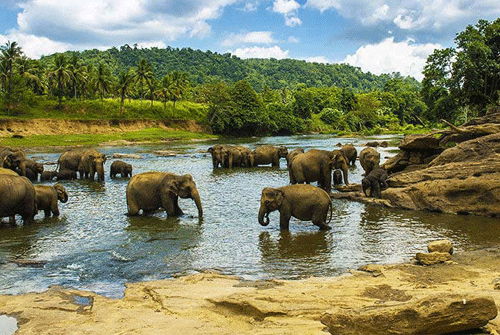 Pinnawala Elephant Orphanage
Pinnawala Elephant Orphanage
Pinnawala Elephant Orphanage (PEO) ; just as the name suggests holds a unique disposition in the ex-situ animal care. It’s success and fame has travelled not just within the country but throughout the world to an extent where Pinnawala synonymous with the Sri Lankan Elephant. The Pinnawala Elephant Orphanage was established by the Sri Lankan Department of Wildlife Conservation in 1975 for feeding and providing care and sanctuary to orphaned baby elephants that were found in the wild.
Package Includes:
Special Notes: We strictly request you to follow COVID-19 health protocol guidelines in the leaflets given to you by our national guide. It’s a must that you should follow these guidelines during the tour which is given by the Sri Lanka health ministry along with the Tourist board to make sure that you are safe and secure from COVID 19.
Package Excludes:
